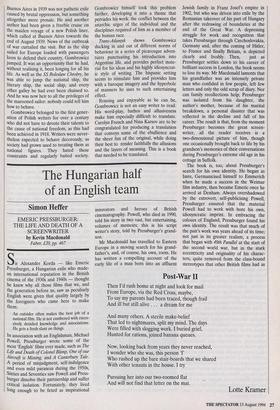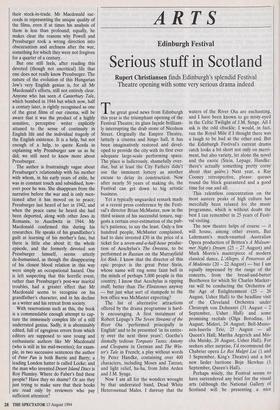The Hungarian half of an English team
Simon Heller
EMERIC PRESSBURGER: THE LIFE AND DEATH OF A SCREENWRITER by Kevin Macdonald Faber, £20, pp. 467 Sir Alexander Korda — like Emeric Pressburger, a Hungarian exile who made- an international reputation in the British cinema of the 1930s and 1940s — thought he knew why all those films that we, and the generation before us, saw as peculiarly English were given that quality largely by the foreigners who came here to make them:
An outsider often makes the best job of a national film. He is not cumbered with exces- sively detailed knowledge and associations. He gets a fresh slant on things.
In association with an Englishman, Michael Powell, Pressburger wrote some of the most 'English' films ever made, such as The Life and Death of Colonel Blimp, One of our Aircraft is Missing, and A Canterbury Tale. A period of misjudgment, self-indulgence and even mild paranoia during the 1950s, Sixties and Seventies saw Powell and Press- burger dissolve their partnership and suffer critical isolation. Fortunately, they lived long enough to be feted as inspirational innovators and heroes of British cinematography. Powell, who died in 1990, told his story in two vast, but entertaining, volumes of memoirs; this is his script writer's story, told by Pressburger's grand- son.
Mr Macdonald has travelled to Eastern Europe in a moving search for his grand- father's, and, of course, his own, roots. He has written a compelling account of the early life of a man born into an affluent Jewish family in Franz Josef s empire in 1902, but who was driven into exile by the Romanian takeover of his part of Hungary after the redrawing of boundaries at the end of the Great War. A depressing struggle for work and recognition that takes Pressburger through Czechoslovakia, Germany and, after the coming of Hitler, to France and finally Britain, is depicted clearly and freshly. Then, just as Pressburger settles down to his career of brilliant success in London, the book seems to lose its way. Mr Macdonald laments that his grandfather was an intensely private man who confided in few people, left few letters and only the odd scrap of diary. Nor can family recollections help; Pressburger was isolated from his daughter, the author's mother, because of his marital breakdown, a personal disaster that was reflected in the decline and fall of his career. The result is that, from the moment Pressburger becomes the great screen- writer, all the reader receives is a two-dimensional picture of him, though one occasionally brought back to life by his grandson's memories of their conversations during Pressburger's extreme old age in his cottage in Suffolk.
The book is, too, about Pressburger's search for his own identity. He began as Imre, Germanicised himself to Emmerich when he made a success in the Weimar film industry, then became Emeric once he arrived at Denham. Always overshadowed by the extrovert, self-publicising Powell, Pressburger ensured that the material Powell had to work with bore his own, idiosyncratic imprint. In embracing the colours of England, Pressburger found his own identity. The result was that much of the pair's work was years ahead of its time; not just in its greater realism, a process that began with 49th Parallel at the start of the second world war, but in the stark eccentricity and originality of his charac- ters, quite removed from the class-bound stereotypes that other British films had as their stock-in-trade. Mr Macdonald suc- ceeds in representing the unique quality of the films, even if at times his analysis of them is less than profound; equally, he makes clear the reasons why Powell and Pressburger took a wrong direction into obscurantism and archness after the war, something for which they were not forgiven for a quarter of a century.
But one still feels, after reading this devoted (though not uncritical) life that one does not really know Pressburger. The nature of the evolution of this Hungarian Jew's very English genius is, for all Mr Macdonald's efforts, still not entirely clear. Anyone who has seen A Canterbury Tale, which bombed in 1944 but which now, half a century later, is rightly recognised as one of the great films of our cinema, will be aware that it was the product of a highly sensitive, perceptive writer explicitly attuned to the sense of continuity in English life and the individual tragedy of the English existence. It is a help, but not enough of a help, to quote Korda in explaining why Pressburger saw us as he did; we still need to know more about Pressburger.
The author is frustratingly vague about Pressburger's relationship with his mother with whom, in his early years of exile, he was in constant touch and subsidised, how- ever poor he was. She disappears from the narrative before the war and is only men- tioned after it has moved on to peace; Pressburger last heard of her in 1942, and when the peace came he heard she had been deported, along with other Jews in Romania, to Auschwitz in 1944. Mr Macdonald confirmed this during his researches. He speaks of his grandfather's guilt at learning of his mother's fate, but there is little else about it; the whole episode, and the formerly devoted son Pressburger himself, seems utterly de-humanised, as though the disappearing of his closest blood relation in this way were simply an occupational hazard. One is left suspecting that this horrific event, rather than Pressburger's post-war marital troubles, had a greater effect that Mr Macdonald seems to recognise on his grandfather's character, and in his decline as a writer and his retreat from society.
With reservations such as this, the book is a commendable enough attempt to cap- ture the immensely complex life of a still underrated genius. Sadly, it is abominably edited, full of egregious errors from which editors are supposed to save young and enthusiastic authors like Mr Macdonald (who is still in his mid-twenties); for exam- ple, in two successive sentences the author of Peter Pan is both Barrie and Barry; a leading London hatter is called Locke; and the man who invented Desert Island Discs is Roy Plumley. Where do Faber's find these people? Have they no shame? Or are they just trying to make sure that their books are read only by reviewers who pay sufficient attention?











































 Previous page
Previous page